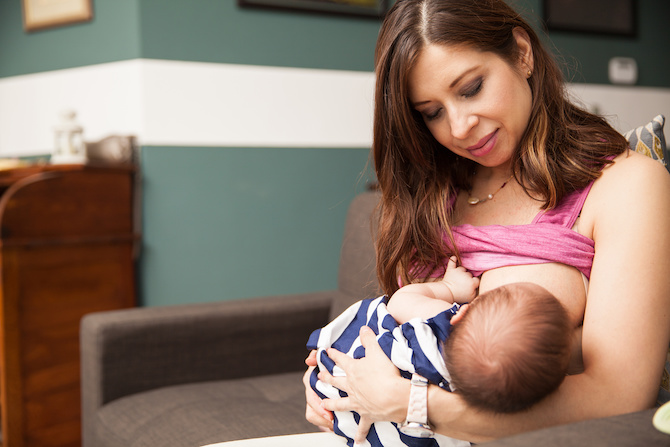As you know, there’s a lot of confusing and false information out there about breastfeeding. Whether you call them old wives’ tales, fables, or myths, you probably hear them repeated (or questioned) by parents-to-be all the time.
Some breastfeeding myths sound very silly and are easy to ignore. Others sound very silly and are … actually true! For parents-to-be, one of the keys to breastfeeding success is learning which of these old beliefs are false and which are true. And that’s where you come in.
To do our part, we’ve collected some of the most common myths about breastfeeding, including 10 that are not true and 2 that actually are. We hope you enjoy reading them, sharing them, and busting them for good!
The NOT True List
Myth #1: You can’t dye your hair or eat sushi while breastfeeding.
Not true. There are no scientific reasons why you can’t dye your hair and eat sushi while breastfeeding. It is smart to avoid eating fish with high levels of mercury and only eat sushi from trusted sources so it doesn’t make you sick. But bacteria or beauty product chemicals won’t reach your breast milk.
Myth #2: People with implants can’t breastfeed.
Not true (usually). If you’ve had breast implants, you may still be able to breastfeed. Implants can affect your milk supply, depending on the type of surgery and if there was any damage to breast tissue or nerves or any scarring in the milk ducts.
Myth #3: You have to drink milk to make milk.
Not true. Milk production is all about supply and demand. The more milk the baby takes from your breast, the more milk you’ll make. Although you don’t need to drink cow’s milk, or almond milk, or any kind of milk, you do need to drink plenty of water while you’re breastfeeding.
Myth #4: Exercise affects the taste of your milk.
Not true. Exercise is a healthy choice, whether you’re breastfeeding or not. While there is no evidence that exercise affects the taste of breast milk, some babies may be put off by the taste of dried perspiration on your skin.
Myth #5: You can’t breastfeed when you’re sick.
Not true. Even if you’re feeling under the weather, breastfeeding is safe unless you are taking a medication that isn’t approved for breastfeeding parents. On the bright side, the antibodies and leukocytes your body produces to fight an illness can be shared through your breast milk to give your baby immunity.
Myth #6: Babies get all the milk they need in the first few minutes.
Not true. Every baby is different. Many things can affect how much milk your baby takes each feeding. Newborns who are learning how to latch on and suck may need to stay on your breast longer. Other babies may feed more quickly and be ready to do something else. To make sure your baby gets enough, let them feed for as long as they want.
Myth #7: Small breasts don’t produce enough milk for a baby.
Not true. The amount of fatty tissue in your breasts is what determines how big they are. But it’s the glandular tissue in your breast that expands during pregnancy and produces milk. Breast size makes no difference in how much milk you can make for your little one.
Myth #8: You should wash your nipples before breastfeeding.
Not true. Babies are born already knowing your scent and sounds. Your nipples produce a substance that the baby smells and has good bacteria that helps to build their healthy immune system. Don’t wash it off before feeding time.
Myth #9: Breastfeeding makes your boobs saggy.
Not true. Droopy breasts happen during pregnancy, not breastfeeding. Pregnancy hormones cause the ligaments under your breasts to loosen and stretch. Unless you’ve gained or lost a lot of weight, your breasts should return to their pre-pregnancy size after you wean your baby.
Myth #10: You can’t get pregnant while you’re breastfeeding.
Not true. If you’re having sex, you can get pregnant, breastfeeding or not. It is true that you’re less likely to get pregnant during the first 6 months of breastfeeding IF your period has not returned and IF you breastfeed regularly. But less likely is still a risk.
Surprising… but TRUE!
Myth #11: Cabbage leaves reduce breast swelling.
True! Cabbage leaves work on the interstitial fluid in the breasts to help reduce swelling in engorged breasts. Lining your bra with clean, cool cabbage leaves for 20 minutes 3 times a day can help relieve swelling and discomfort.
Myth #12: Eating garlic makes your baby nurse more.
True! Studies have shown that eating garlic boosts the flavor of breast milk, peaking about two hours after garlic consumption. And apparently many babies love the taste of garlic in breast milk — suckling more energetically and taking in more milk. Scampi, anyone?
Looking Forward
These are exciting times for everyone committed to educating parents-to-be in ways that complement individual learning styles, lifestyles, and personal preferences. Our goal is to provide nurses and educators with innovative, timely, evidence-based materials that can help you prepare your students to become successful, confident parents. If there is anything we can do to make your job easier, please call us at 800.476.2253. We look forward to working with you!



